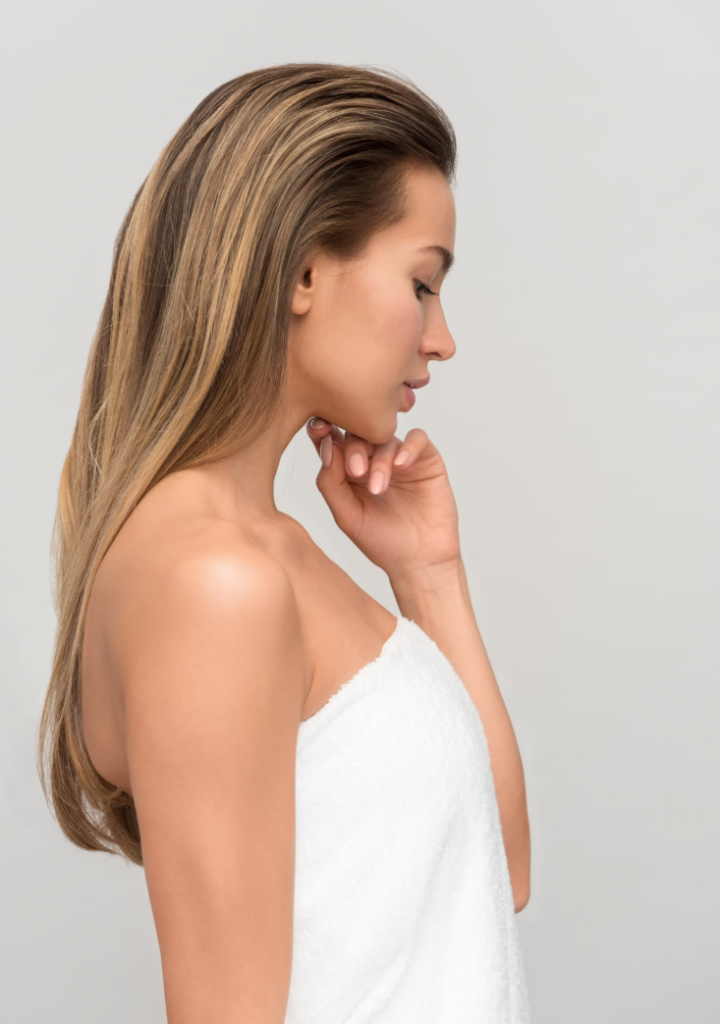
Introduction: The Hair Oil Dilemma
Let’s be honest—hair oils are both loved and loathed. While they nourish and revitalize, many come with overpowering scents that cling to your hair for days. The struggle to find a high-performance hair oil that doesn’t smell like a mystery spice rack or a damp forest is real. But what if you could get all the benefits without the stink?

Why Hair Oils Matter for Hair Health
Hair oils aren’t just about shine. They serve deep, biological functions that promote a healthy scalp and vibrant strands.
Hydration and Moisture Retention
Dry, brittle hair is often the result of a moisture imbalance. Hair oils seal the hair shaft, preventing water loss and leaving your locks soft and supple.
Scalp Nourishment and Growth Support
A healthy scalp equals healthier hair. Oils like castor and jojoba penetrate the scalp, encouraging blood circulation and delivering essential nutrients for growth.
Frizz Control and Shine Enhancement
Flyaways and dullness? Natural oils help smooth down the cuticle and reflect light, enhancing shine and manageability.
The Common Problem: Smelly Hair Oils
Despite their many benefits, some hair oils have a major downside—their scent.
What Causes the Strong Odors?
Many oils are cold-pressed or unrefined, preserving their natural odor, which can range from nutty to downright funky. Others are infused with herbs that add an overpowering earthy smell.
The Psychological Impact of Scent
Scent is powerful—it’s tied to emotion and memory. If your hair smells off-putting, it may affect your confidence, social comfort, or even how often you use the oil.
Key Criteria: What Makes a Good (and Pleasant) Hair Oil
If you’re serious about choosing the right hair oil, consider these qualities.
Non-Greasy Formula
Nobody likes oily residue that transfers onto pillows or clothes. Look for oils that absorb well and don’t leave your scalp or hair feeling slick.
Lightweight and Absorbent
The best oils penetrate the hair shaft rather than sitting on top. Grapeseed and argan oils are excellent in this regard.
Subtle, Natural Fragrance
Natural scents like almond, argan, or moringa provide a hint of freshness without overwhelming your senses.
Top Hair Oils That Deliver Results Without the Funk
Argan Oil – The All-Rounder
Benefits
Often called “liquid gold,” argan oil is rich in vitamin E, antioxidants, and fatty acids. It strengthens hair, reduces frizz, and adds a glossy shine.
Scent Profile
Mild, nutty, and barely noticeable—perfect for those with scent sensitivity.
Jojoba Oil – Scalp’s Best Friend
Benefits
Jojoba oil closely mimics the natural sebum of the scalp, making it ideal for balancing oil production and preventing dandruff.
Scent Profile
Neutral and soft, with a barely-there aroma that fades quickly.
Grapeseed Oil – Lightweight Wonder
Benefits
Grapeseed oil is perfect for those with fine hair. It hydrates without weighing hair down and helps lock in moisture.
Scent Profile
Extremely light, almost odorless—ideal for layering with other products or perfumes.
Moringa Oil – For Strength and Shine
Benefits
Packed with vitamins A and C, moringa oil strengthens hair, reduces split ends, and restores shine to dull strands.
Scent Profile
Delicate and slightly earthy, but very mild compared to other botanical oils.
How to Use Hair Oils Without Overpowering Your Senses
Application Tips
Always start with a small amount and focus on mid-lengths and ends unless using for scalp treatment. Apply on damp hair to maximize absorption.
Combining With Essential Oils
Diluting hair oil with a drop or two of essential oils like lavender or rosemary can neutralize any lingering odor and add a pleasant twist.
Ingredients to Avoid if You’re Sensitive to Smells
Avoid unrefined castor oil, neem oil, and certain ayurvedic oils like bhringraj unless they are deodorized. These tend to have pungent, lingering odors.
Real Users Speak: Testimonials on Non-Smelly Hair Oils
“I’ve been using argan oil daily and get compliments on how fresh my hair smells,” says Leena, a beauty blogger.
“Grapeseed oil changed the game for me—it’s like a moisturizer for my hair without the stink,” shares Brian, a fitness coach.
“Jojoba oil helped my itchy scalp and doesn’t clash with my perfume,” notes Maria, a hairstylist.
Conclusion: Healthy Hair Without the Stink
Hair oils can be a game-changer, but the wrong scent can ruin the experience. Fortunately, options like argan, jojoba, grapeseed, and moringa oils offer stellar results without offensive odors. When chosen wisely, a hair oil can make your hair healthier, shinier, and more manageable—without turning your head into an olfactory battlefield.
FAQs
What’s the best hair oil for people with sensitive noses?
Argan oil is widely loved for its mild, almost scentless profile while still delivering great benefits.
Can I mix essential oils with hair oil to improve the scent?
Yes! Essential oils like lavender, rosemary, and peppermint not only improve fragrance but also boost hair health.
How often should I apply hair oil?
Once or twice a week for deep treatment or daily in small amounts for frizz control and shine.
Do scented oils irritate the scalp?
Heavily scented or unrefined oils can sometimes cause irritation. Always patch test before regular use.
Is there a way to remove hair oil smell after application?
Rinse thoroughly, use a fragrant conditioner, or follow up with a light hair mist or leave-in product to mask any lingering odor.






